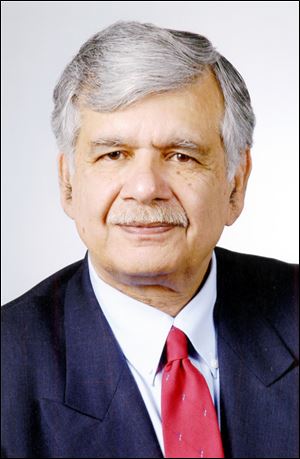
COMMENTARY
What can India’s new leader do?
People hope Modi brings home-state success to world stage
6/9/2014
Hussain
The recent landslide victory of Narendra Modi and his Bharatiya Janata Party (BJP) in India have raised hopes for the same sort of national economic miracle that he is credited with bringing about in his home state.
Coupled with the euphoria of a possible positive change, though, is the fear that his policies will be detrimental to India’s minorities.
The BJP rose to electoral victory partly because of disenchantment with the Indian National Congress government led by Mr. Modi’s predecessor as prime minister, Manmohan Singh. He had been thrust into the job by Congress party leader Sonia Gandhi.
India showed steady growth early in Mr. Singh’s term. But the economy sputtered in recent years.
Given the dictatorial tendencies of the Gandhi-Nehru dynasty, Mr. Singh did his best, but it was not good enough for voters. In Mr. Modi, India’s voters saw a better future.
During his three terms as chief minister of the state of Gujarat, he successfully courted foreign investors, removed bureaucratic hurdles, and delivered on his promise of greater prosperity. His massive investment in infrastructure made it possible for the state’s industrial and agriculture sectors to flourish.
Although his followers point to this economic growth, his detractors point to an incident in 2002 when 1,000 people, mostly Muslims, were killed in civil strife that involved police.
The Indian Supreme Court absolved Mr. Modi of direct complicity in the riot. But he never condemned the episode and has refused to answer questions on the subject.
He walked out of an interview with CNN when the interviewer pressed him on the Gujarat rioting. The violence remains a blot on his reputation, but has not proven to be a political liability.
Mr. Modi’s political philosophy is deeply rooted in a doctrine that promotes Hindu supremacy. Since childhood, he has been a member of Rashtriya Swayamsevak Sangh, a Hindu ultra-nationalist party from which the BJP emerged.
Because of the BJP’s overt religious overtones, there are few non-Hindus in the party. In recent elections, the BJP had only seven Muslims candidates among 472 for Parliament. All seven were defeated.
Muslims constitute 15 percent of India’s population. There are fewer Muslims in Parliament than ever before.
During my recent travels in India, I noticed that Muslims generally were afraid of Mr. Modi’s anti-Muslim leanings. A majority of Hindus, both religious and secular, supported him.
Religiously inclined Hindus like Mr. Modi’s philosophy. Secular and liberal Hindus like his economic message and have shifted to the BJP.
After his election, Mr. Modi invited his counterpart in Pakistan, Nawaz Sharif, to attend his swearing-in ceremony in New Delhi last month. They had a long private meeting. Mr. Modi, given his electoral mandate, could accomplish a rapprochement between the two countries that has defied leaders on both sides.
Governing India is radically different from ruling Gujarat. In Gujarat, Mr. Modi could afford to identify with Hindu zealots. As prime minister, he will have to move to the center.
In 1996, another BJP leader, Atal Bihari Vajpayee, was elected prime minister. During his eight years in office, he initiated substantive dialogue with Pakistan.
Mr. Sharif was Pakistan’s prime minister at that time. It was widely believed that the two leaders had reached an understanding on the thorny issue of Kashmir.
As part of a confidence-building measure, Mr. Vajpayee traveled by bus from Amritsar, India, to Lahore, Pakistan, 30 miles away. It was the beginning of a new phase of peace.
But the peace bus was derailed in the mountains of the Indian town of Kargil, when Indian and Pakistani forces engaged each other in bloody conflict. There are strong elements in both countries against any rapprochement.
Mr. Modi’s political journey from Gujarat to New Delhi has been interesting. Whether he has the capacity to morph from a provincial politician into a national and international statesman is hard to tell.
But if he could, it would be good for India and Southeast Asia.
Dr. S. Amjad Hussain is a retired Toledo surgeon whose column appears every other week in The Blade. Contact him at: aghaji@bex.net